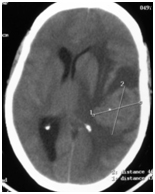




Vijay Kumar
I was diagnosed as having spine tuberculosis. Despite on treatment my back pain persisted and I was unable to walk.
Treatments
Brain Tumor Surgery
What are brain tumors?
Brain tumors can be primary or secondary. They can grow from the cells of the brain, blood vessels in the brain, nerves that emerge from the brain or the membranes covering the brain. Benign (non-cancerous) brain tumours are generally slow-growing tumours. Malignant (cancerous) brain tumours are rapid growing and they spread into the surrounding brain. Secondary or metastatic brain tumours grow from cancer cells that originate from a primary cancer located in another organ (eg. lung, breast or colon).
What are the causes?
A few genetically inherited diseases have been identified that can increase the risk of the development of brain tumours.
What are the symptoms?
The symptoms may be generalized or localised.
Generalised symptoms are due to increased pressure exerted on the brain and include:
- A recurring headache that may worse in the morning.
- Nausea and vomiting
- Seizures
- Increased drowsiness
Localised symptoms depend on the location of the tumour and include:
- Progressive weakness or numbness in the arms or legs
- Progressive difficulty with speech, hearing, concentration or vision, including double-vision
- Memory loss or a change in memory
- A significant change in personality or behaviour
How brain tumors diagnosed?
Specialised imaging tests such as Computed Tomography (CT scan), Magnetic Resonance Imaging (MRI) will usually be performed.
What are the treatment options?
Exact treatment is planned depending upon the tumor grade. Grade one and two tumors have good survival rate where as grade three and four tumors have poor survival rate.
Stereotactic brain surgery for small lesions can be done through a small hole.
Surgery(Craniotomy) - In most cases, surgery using microsurgical techniques is required to remove as much tumour with minimal injury to the brain.
Radiosurgery - For selected small tumours, Gamma Knife Surgery using very strong focused gamma rays can be given over a few hours to arrest tumour growth without the need for surgery.
Radiation Therapy - For cancerous brain tumours that cannot be completely removed, surgery may be followed by external beam radiation delivered by a linear accelerator over 4-6 weeks to destroy the remaining tumour cells.
Chemotherapy - Drugs that destroy or slow down the growth of tumour cells can be administered either orally or by intravenous injection. Hair loss, nausea and susceptibility to infection are potential side effects of chemotherapy.
Case illustration

44 years female presented to us with history of headache and vomiting of 1month duration. Scan done revealed brain tumor. She underwent surgery. Her biopsy report came as grade III astrocytoma. She received radiation and chemotherapy.




